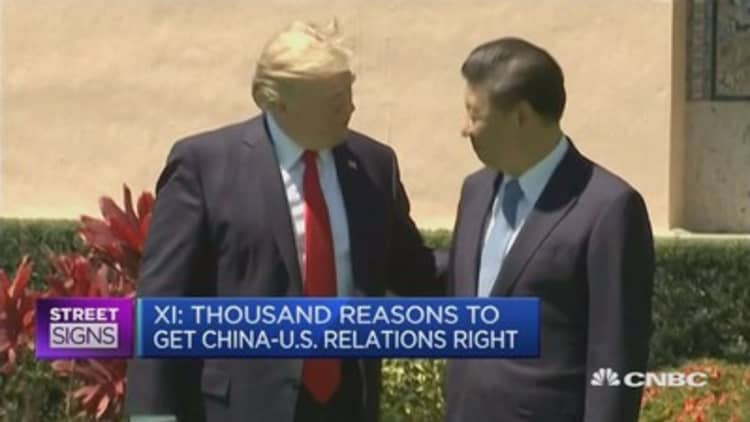
Chinese President Xi Jinping and U.S. President Donald Trump concluded their first in-person meeting, striking a friendly tone, avoiding political gaffes and even agreeing to tackle trade imbalances. But soon after the meeting ended, Chinese state media scolded Trump for his military action in Syria.
China will make concessions to give the U.S. better market access in two areas — financial sector investments and beef exports — in efforts to avoid a trade war, the Financial Times reported. This is part of a wider 100-day plan to be hashed out between the two sides.
The Trump-Xi meeting spotlighted trade tensions between the two countries, and other items high on the agenda included discussing a response to an increased nuclear threat out of North Korea. Although the talks were overshadowed by a U.S. strike in Syria, experts have said the meeting was a success given that both sides remained cordial, and took a step toward tackling the trade issue by increasing China's imports from the U.S.
"This is the 'good' way to close the bilateral trade gap," wrote Carl Weinberg, chief economist of High Frequency Economics, in a note about the meeting and 100-day plan. "U.S. consumers' access to less expensive imported goods will be unaffected, but incremental jobs will be created by incremental production."
Trump has long accused China of unfair trade practices, leading to a trade deficit of more than $300 billion. The Chinese argument has been that the relationship has benefited American consumers in the form of cheaper goods, and increased China investment in the U.S.
For now, the threat of a trade war is on ice, but how things shake out will depend on negotiations regarding the 100-day plan.
"If we don't get some tangible results within the first 100 days, I think we'll have to examine whether it's worthwhile continuing them," Secretary of Commerce Wilbur Ross said on Fox News. Before the meeting, the Commerce Department did say it was undertaking a review of U.S. trade deficits by product, due out in late June.
On the China side, however, no public comments have yet been made regarding the trade plan.
Whether or not the U.S. will label China a currency manipulator also remains to be seen. This was a Trump campaign promise, but he has yet to make good on that call, and the term was absent from official comments recapping the meeting.
On the whole, the U.S. and China both sounded an optimistic tone — Trump even accepted Xi's invitation to visit China later this year.
"We have a thousand reasons to get China-U.S. relations right, and not one reason to spoil the China-US relationship," Xi said, according to state media.
Trump said an "outstanding" relationship was developing, and that "goodwill and friendship were formed, but only time will tell on trade."
Chinese state media also trumpeted the meeting as a success, but waited until after it concluded to blast the U.S. for its strike in Syria. State outlet Xinhua was critical of the move, calling it the actions of a weak politician who was attempting to flex his muscles, and to deter rumors of ties to Russia, an ally of the Syrian government.
Given that government officials rarely speak to foreign press, commentary in Chinese state media is closely watched for clues into Communist Party thinking.


